Ripon College (Wisconsin)
Ripon College is a private liberal arts college in Ripon, Wisconsin. As of fall 2018, Ripon College's student body stood at around 800, the majority of whom live on campus. Students come from 14 nations and 33 states, and 53% are female while 47% are male. Nearly 70% of students are Wisconsin residents.[5]
 | |
| Motto | Fides Christi Scientia |
|---|---|
Motto in English | Faith in Christ is Knowledge |
| Type | Private liberal arts college |
| Established | 1851 |
| Endowment | $92.8 million (2018)[1] |
| President | Zach P. Messitte[2] |
| Students | 807 (2019)[1] |
| Location | , , United States 43.843640°N 88.841256°W |
| Campus | Small town 250 acres (100 ha) |
| Colors | Red and black[3] |
| Athletics | NCAA Division III – Midwest Conference |
| Nickname | Red Hawks[2] |
| Mascot | Rally the Red Hawk [4] |
| Website | www |
 | |
History
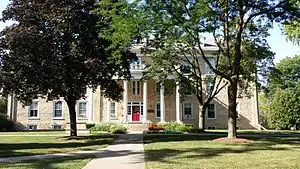
Ripon College was founded in 1851, although its first class of students did not enroll until 1853. Ripon's first class, four women, graduated in June 1867.[6] The college was founded with ties to local churches, but early in its history the institution became secular. In 1868 formal ties with Presbyterian and Congregational churches were cut, but Ripon would retain some ties to its religious past. During the nineteenth century students were required to attend two church services each Sunday. The first six presidents of Ripon College had clerical backgrounds, as did the previous president, David Joyce. Today the school offers classes in world religions, but there are no required religious courses, and students are not required to attend religious services. The college recognized social and academic Greek letter societies in 1924. The Ripon chapter of Phi Beta Kappa was started by Clark Kuebler, who served as president from 1944 to 1955.[7]
The National Forensic League was founded at the college in 1925. Since that time communication has been important at the college, which today organizes its endeavors as part of a Communication Consortium that provides real-world experience to students, such as managing the campus newspaper, mentoring people within the broader community about communication, and participating in forensics.[8]
Academics
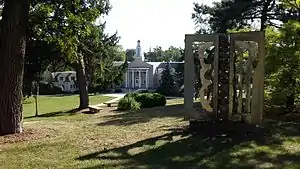
At Ripon College every student is expected to complete a major. The college is on the semester system and has two optional three-week summer sessions known as Liberal Arts In Focus. These In Focus programs include both on-campus offerings as well as travel courses to Italy, England, and elsewhere.[9] Students may choose from 32 majors, a variety of pre-professional advising options and also opt to self-design a major. Off-campus study is highly encouraged; nearly one-third of all Ripon College students elect to spend a semester off-campus on a focused area of study.[10] Ripon has a student-to-faculty ratio of 11.5:1.[11]
Catalyst Curriculum
Students take five Catalyst courses that focus on solving real-world problems. After completing the Catalyst, students receive a certificate in Applied Innovation. This certificate is similar to a minor at other schools. Ripon College provides a four-year graduation guarantee to all students who remain in good academic standing, declare a major course of study by the end of sophomore year, and follow an approved course plan.
Faculty mentoring
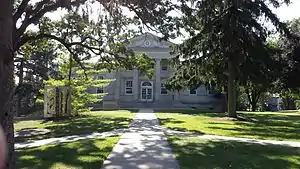
Each incoming student is assigned a faculty mentor based on their area of interest. Together, faculty mentors and staff in the Office of Career Development work with students throughout their time on campus to help set goals and construct a course plan to reach those goals.[12]
Associated Colleges of the Midwest
Ripon is a member of the Associated Colleges of the Midwest (ACM), a grouping of private liberal arts schools that share expertise and collaborate on off-campus study programs. The College is also affiliated with the Annapolis Group of private liberal arts colleges and is a member of the Council of Independent Colleges.[13]
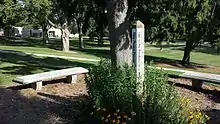
Center for Politics and the People
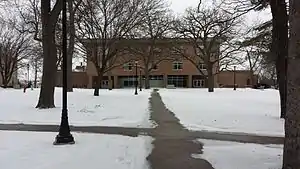
The Center for Politics and the People [14] was established in spring 2014. The center sponsors scholarship and hosts special events featuring elected officials and policy makers, high-level campaign operatives, academic experts, journalists, prognosticators and citizens representing a spectrum of political views. The center also manages the college's annual Career Discovery Tour to Washington, D.C., and helps place students in internships.
Badger Boys State
Since 1941 the College has also served as the host site for Badger Boys State, a public affairs program for more than 800 Wisconsin high school students to learn about the civic process. Such students establish and run a mock government.
Arts
The college's C.J. Rodman Center for the Arts houses the Departments of Art, Music, and Theater.
Visual art
The Art Department manages two gallery spaces, one of which is dedicated to student work and the other to art more broadly. Work by students and professional artists is also shown across campus. A sculpture garden is located adjacent to the building. Two art works of note in the permanent collection of the college are life-size portraits by Anthony van Dyck of Princess Amalia of the House of Orange and Sir Roger Townshend. The Classics department also manages a collection of classical Greek and Roman artifacts, many of which are displayed in the campus library.
Music
The college has a music department which offers classes, lessons, and ensembles. Students of any major may participate in the music department and are eligible for music scholarships. The department offers the following ensembles: orchestra, symphonic wind ensemble, jazz ensemble, and two choirs (Chamber Singers and Choral Union).[15] All musical performances by campus groups are free to students and the public. The program also hosts visiting musicians each semester, and performances are free to all students.
Theater
The college's theater program produces three productions per year, with students from any major encouraged to act or be involved with set, costume, and makeup design. Each theater major directs a one-act production their senior year, as part of a campus theater festival. Students regularly participate in the Region III Kennedy Center American College Theatre Festival. All theatrical events are free to students and the public.
Sustainability and the environment
Sustainability initiatives
Ripon College attempts to be a sustainable institution. It has a fleet of campus hybrid vehicles, a recycling program, and uses energy efficient light bulbs.
Ceresco Prairie Conservancy
The college is home to the Ceresco Prairie Conservancy, consisting of 130 acres (53 ha) of native prairie, oak savanna, and wetland habitat in the making. The Ceresco Prairie Conservancy is used by different classes in a number of different disciplines.[16] It tries to maintain a healthy population of bees in the area, by including them in the prairie area. Trails for walking and snowshoeing throughout this area connect to a municipally run nature park, the South Woods. A student group, EGOR: The Environmental Group of Ripon, focuses on awareness of these issues. Students can major in environmental studies, which is an interdisciplinary program.[17]
Media
- Ripon College Days – a monthly newspaper
- WRPN-FM – a campus radio station with digital broadcasts
- RCTV – a television production group
- Parallax – a literary magazine
- Crimson – yearbook that used to be distributed every spring. Last issue was Spring of 2017
Student life
Clubs
Over 60 student clubs on campus range from fraternities and sororities to special interest groups (focuses include the environment, sexual orientation, race, religion, etc.) to academics (art, anthropology, physics, sociology, music, theater, mathematics, and others) to service groups (Amnesty, animal welfare, etc.) to politics (Democrats, Republicans, Libertarians, and Greens).[18]
Greek life
The college has seven residential dormitories with several sororities, including Alpha Chi Omega, Alpha Delta Pi, and Kappa Delta. The college has four all-male fraternities including chapters of Sigma Chi, Theta Chi, Phi Delta Theta, and a local fraternity, Phi Kappa Pi, (named Merriman for the college's founding president). Ripon College also has one local co-ed fraternity, Theta Sigma Tau, founded in 1910, the oldest local fraternity on campus. It became co-ed in 1980 after severing ties with Sigma Nu fraternity. Students in all five fraternities live in dormitories on campus, following the recent removal of Phi Kappa Pi from Merriman House. Phi Kappa Pi was relocated to the Quad living area, with the other three fraternities, after the Merriman house was condemned and the board of Trustees determined that all students (unless exempted) should reside in residence halls. The three sororities live in one dorm, Johnson Hall, which includes independent and first year women. [19]
Diversity
People of color compose 10% of the student population.[20] The McNair Scholars program supports first generation college students and African American, Native American, and Hispanic students who wish to attend graduate school.[21] An office of Multicultural and International Student Affairs serves students of color, international students, and gay and lesbian students through mentoring and programming.[22] Student groups that focus on the experiences of racially diverse, culturally diverse, and LGBT students are also active on campus.[23]
Athletics
Ripon athletics teams participate in NCAA Division III as part of the Midwest Conference. Conference competition for men includes: cross-country, football, soccer (fall), basketball (winter), swimming (winter), indoor and outdoor track, baseball, golf, and tennis (spring). Conference competition for women includes: cross-country, golf, soccer, tennis, volleyball (fall), basketball (winter), swimming (winter), indoor and outdoor track, and softball (spring). The Ripon Red Hawks Cycling Team competes at the Division II level in the Midwestern Collegiate Cycling Conference (MWCCC), governed by USA Cycling.
Campus facilities
Education buildings and offices
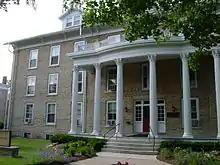
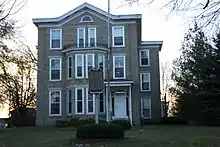
The Ripon College Historic District is on the National Register of Historic Places.[24]
- Bartlett Hall – part of the college union and houses student services and student organization offices
- Carnegie Library Building – downtown building, holds president’s office and dean of students
- East Hall – classrooms and faculty offices (the original campus building)
- Farr Hall – science laboratories, classrooms, and faculty offices
- Harwood Memorial Union – Great Hall, The Pub, lounges, mail center, radio station (WRPN), and student organization offices
- Kemper Hall – Information Technology Services
- Lane Library – Ripon College Library and Waitkus Computer Lab
- S.N. Pickard Commons – coffee shop, dining facility
- Rodman Center for the Performing Arts – theatre, music, and studio art
- Smith Hall – business and financial aid offices
- Willmore Center – full-sized gymnasium, the tartan area, swimming pool, dance studio, locker rooms [25]
- Todd Wehr Hall – classrooms and faculty offices .
- West Hall – classrooms and faculty offices
Residence halls
- Campus Apartments – Apartment style living for fourth- and fifth-year students
- Johnson Hall – Women only and sororities
- Merriman House – Former fraternity house of Phi Kappa Pi
- The Quad – Upper-class students and fraternities
- Anderson Hall – Co-ed; the residence of Phi Kappa Pi
- Bovay Hall – Co-ed
- Brockway Hall – Men Only; the residence of Sigma Chi and Theta Chi fraternities
- Mapes Hall – Co-ed; the residence of Theta Sigma Tau co-ed fraternity and Phi Delta Theta fraternity
- Scott Hall – First-year men, upper-class men and women
- Tri Dorms (Shaler Hall, Evans Hall, Wright Hall) – first-year women and men
Recognition
The school's volunteerism and community service earned it a place on the President's Higher Education Community Service Honor Roll for 2009.[26] In 2009, Forbes ranked Ripon 100th on the list of America's 600 best colleges.[27] The school earned an award from The Chronicle of Higher Education as being one of the "Great Colleges to Work For" in the nation, an award given to institutions that are well-managed and where faculty and staff are enthusiastic about their jobs.[28]
Notable alumni
- Ryan C. Amacher, university administrator
- Frank L. Anders, Medal of Honor recipient
- Jack Ankerson, NFL player
- Dick Bennett, head coach of University of Wisconsin-Green Bay Phoenix, Wisconsin Badgers, and Washington State Cougars men's basketball teams
- Emma H. Blair, class of 1872, editor, translator, historian, and compiler
- Joseph H. Bottum, South Dakota state senator
- Theodore Brameld, philosopher
- Halbert W. Brooks, Wisconsin State Representative
- Dennis Conta, politician and consultant
- Bernard Darling, NFL player
- W. R. Davies, second president (1941–1959) of University of Wisconsin–Eau Claire
- Harrison Ford, Academy Award-nominated actor and star of franchise films such as Indiana Jones, Star Wars, and Blade Runner
- Justice Michael Gableman, class of 1988, Wisconsin State Supreme Court Justice 2008–present[29]
- George Glennie, NFL player
- Tubby Howard, NFL player
- Bruno E. Jacob, founder of National Forensic League
- Al Jarreau, class of 1962, Grammy Award-winning singer
- Harley Sanford Jones, U.S. Air Force general
- Alan Klapmeier, co-founder of Cirrus Design Corporation and CEO of One Aviation Corporation
- Lewis G. Kellogg, Wisconsin State Senator
- Oscar Hugh La Grange, Union Army general
- Frances Lee McCain, actress
- Charlie Mathys, NFL player for Hammond Pros and Green Bay Packers
- James Megellas, member of 82nd Airborne during World War II
- Elmer A. Morse, U.S. Representative
- Orville W. Mosher, Wisconsin State Senator
- Ingolf E. Rasmus, Wisconsin State Representative
- Joan Raymond, superintendent of the Houston Independent School District[30]
- Dick Rehbein, NFL assistant coach
- Charles Rutkowski, professional football player
- Ted Scalissi, professional football player
- Webb Schultz, MLB player
- Champ Seibold, NFL player for Green Bay Packers and Chicago Cardinals
- Wally Sieb, NFL player
- Dave Smith, professional football player
- Harry G. Snyder, Wisconsin State Representative and Court of Appeals Judge
- Scott Strazzante, photojournalist for the Chicago Tribune and the San Francisco Chronicle
- Richard Threlkeld, correspondent with CBS News and ABC News
- Michael Tinkham, class of 1951, superconductivity physicist
- Spencer Tracy, class of 1924, Academy Award-winning actor
- Samuel R. Webster, Wisconsin State Representative
- Lloyd Wescott, New Jersey agriculturalist and civil servant
- Cowboy Wheeler, NFL player
- Jon Wilcox, State Supreme Court Justice from 1992–2007
- Gary G. Yerkey, journalist
- Otto Julius Zobel, inventor of m-derived filter and Zobel network
Notable faculty
- Edward Daniels, geologist
- David Graham, poet
- Karen Holbrook, President of Ohio State University
- Bruno E. Jacob, founder of the National Forensic League
- Wacław Jędrzejewicz, Polish diplomat
- Alfred E. Kahn, Chairman of the Civil Aeronautics Board
- Minerva Brace Norton, educator and author
- Russell Burton Reynolds, U.S. Army Major General
- Clarissa Tucker Tracy, botanist
- William Hayes Ward, President of the American Oriental Society
References
- "Ripon College". U.S. News Best Colleges. U.S. News & World Report. n.d. Retrieved 14 August 2019.
- "Ripon at a Glance". Ripon College. Ripon College. n.d. Retrieved 14 August 2019.
- "Graphics Standard and Usage Guide - Ripon College". Issuu. Ripon College. 7 March 2013. Retrieved 14 August 2019.
- "'Rally' the Red Hawk". Ripon College Athletics. Ripon College. n.d. Retrieved 14 August 2019.
- "Ripon at a Glance". Ripon College. Retrieved 26 July 2019.
- "Ripon College". Forbes. Retrieved 2018-06-04.
- "Ripon College Presidents | Ripon College". Retrieved 2019-06-28.
- https://www.ripon.edu/communication-consortium/
- "Academics - Ripon College". Retrieved 6 October 2016.
- http://www.ripon.edu/academics/title=Ripon. Retrieved 2012-05-15. Missing or empty
|title=(help) - "About - Ripon College". Retrieved 6 October 2016.
- "Advising & Support | Ripon College". www.ripon.edu. Retrieved 2018-01-29.
- "The Council of Independent Colleges". Retrieved 6 October 2016.
- "Center for Politics and the People - Ripon College". www.ripon.edu. Retrieved 2 April 2018.
- "Ripon College : Clubs & Organizations". Ripon.edu. Retrieved 2013-12-09.
- "Ripon at a Glance - Ripon College". www.ripon.edu. Retrieved 2 April 2018.
- "Campus Sustainability - Ripon College". Retrieved 2016-10-06.
- "Clubs & Organizations". Ripon College. Retrieved March 12, 2018.
- "Phi Kappa Pi fraternity alumni club sues Ripon College". Fox News. Retrieved 2010-06-30.
- "About Ripon College : Fast Facts". Ripon.edu. Archived from the original on 2014-07-09. Retrieved 2013-12-09.
- "Ripon College : McNair Program". Ripon.edu. Retrieved 2013-12-09.
- "Ripon College: Multicultural & International Student Affairs". Ripon.edu. Retrieved 2012-05-15.
- "Ripon College: Clubs & Organizations". Ripon.edu. Retrieved 2013-12-09.
- "National Register Information System – Ripon College Historic District (#95000679)". National Register of Historic Places. National Park Service. November 2, 2013. Retrieved January 20, 2020.
- "New Athletics, Health and Wellness Center Will Honor Alumna and Trustee" May 18, 2017. https://www.ripon.edu/2017/05/18/new-athletics-health-and-wellness-center-will-honor-alumna-and-trustee/
- "Welcome to Corporation for National and Community Service" (PDF). Archived from the original (PDF) on 2013-02-28. Retrieved 6 October 2016.
- "America's Best Colleges". Forbes. August 5, 2009.
- "Great Colleges to Work For". Retrieved 6 October 2016.
- Archived May 27, 2010, at the Wayback Machine
- McAdams, Donald R. Fighting to Save Our Urban Schools-- and Winning!: Lessons from Houston. Teachers College Press, 2000. ISBN 0807738840, 9780807738849. p. 1.